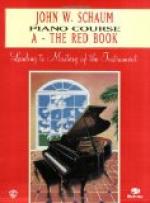“I am always increasing my repertoire, though I find the public does not care for new things; it prefers the old. It may listen to the new if forced to, but it will not attend a recital unless various familiar things are on the program.
“I have made several tours in America. The rush of travel from place to place over there, is fatiguing, but I feel that your people are very appreciative. You demand the best, and concert giving in America is so costly that a manager can afford to exploit only the highest artists. Here in London, where the expense is only about two hundred dollars, say, to get up a recital, almost any one can scrape together that sum and bring himself or herself before the public. In America the outlay is four or five times greater. No wonder that only a very good artist can take the risk.”
On leaving, Mr. Hambourg took us to another room, where he showed us with much satisfaction, a very valuable painting of the old Italian school, by Ghirlandajo, of which he is very fond.
XII
TOBIAS MATTHAY
WATCHING THE ARTIST TEACHER AT WORK
One of the first things accomplished after my arrival in London was to seek out Tobias Matthay, the composer and teacher, for an echo of his fame had reached me across the water.
Matthay has done much to make the principles of piano technic so clear and simple that even a child can understand them. If he has stated facts in a way which seems to some revolutionary it is because these facts are seldom understood by the rank and file of piano teachers. The work he has done has compelled attention and admiration; his ideas are now accepted as undeniable truths by those who at first repudiated them. The writings of Mr. Matthay will doubtless be better known in America a little later on than they are at present. They consist in part of an exhaustive work on The Act of Touch in all its Diversity; First Principles of Piano Playing; Relaxation Studies; The Child’s First Steps in Piano Playing; The Principles of Fingering and Laws of Pedaling; Forearm Rotation Principle; and, in press, The Principles of Teaching Interpretation. These very titles are inspiring and suggestive, and show Matthay to be a deep thinker along educational lines.
[Illustration: Cordially Yours, Tobias Matthay]
Matthay’s activities are enormous. He is professor of advanced piano playing at the Royal Academy of Music; also founder and head of his own school of piano playing. So occupied early and late is he, that it is almost impossible to get a word with him. I was fortunate enough, however, to obtain an hour’s audience, and also permission to attend various private classes at the Royal Academy, and hear a number of pupils in recital.
In appearance Matthay is a striking personality. His head and features recall pictures of Robert Louis Stevenson. His tall, muscular form has the stoop of the scholar; and little wonder when one remembers he must sit in his chair at work day in and day out. His somewhat brusk manner melts into kind amiability when discussing the topics in which he is vitally interested. In his intercourse with students he is ever kind, sympathetic and encouraging. They, on their part, treat him with profound respect.




